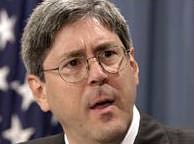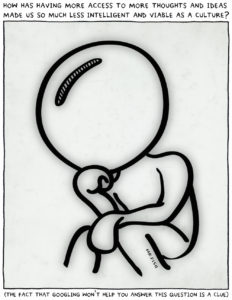Pentagon Gives Cherry-Pickers a Slap on the Wrist
An internal review by the Pentagon found that the intelligence cherry-picking policy shop run by Douglas Feith (above), a group President Bush relied on to sell the war, acted inappropriately but not illegally. The inspector general's findings will be made public at a Senate hearing Friday.
An internal review by the Pentagon found that the intelligence cherry-picking policy shop run by Douglas Feith (right), a group President Bush relied on to sell the war, acted inappropriately but not illegally. The inspector general’s findings will be made public at a Senate hearing Friday.
Your support is crucial...AP:
At the center of the prewar intelligence controversy was the work of a small number of Pentagon officials from Feith’s office and the office of Deputy Defense Secretary Paul Wolfowitz who reviewed CIA intelligence analyses and put together their own report. When they briefed Rumsfeld on their report in August 2002 — a period when Vice President Dick Cheney and other administration officials were ratcheting up their warnings about the gravity of the Iraq threat — Rumsfeld directed them to also brief CIA Director George Tenet.
Their presentation, which included assertions about links between al-Qaida and the Iraqi government, contained a criticism that the intelligence community was ignoring or underplaying its own raw reports on such potential links.
The controversy has simmered for several years. The Senate Intelligence Committee included the Office of Special Plans in its investigation into the prewar intelligence on Iraq, but the committee did not finish that portion of its work when it released the first part of its findings in July 2004.
In a dissenting view attached to the committee’s report, three Democratic senators, including Levin, said that Pentagon policymakers sought to undermine the analysis of the intelligence community by circumventing the CIA and briefing their own views directly to the White House. This was a particular problem when the spy agencies’ judgments did not conform to the administration’s dire views on Iraqi links to al-Qaida, the senators said.
As we navigate an uncertain 2025, with a new administration questioning press freedoms, the risks are clear: our ability to report freely is under threat.
Your tax-deductible donation enables us to dig deeper, delivering fearless investigative reporting and analysis that exposes the reality beneath the headlines — without compromise.
Now is the time to take action. Stand with our courageous journalists. Donate today to protect a free press, uphold democracy and uncover the stories that need to be told.





You need to be a supporter to comment.
There are currently no responses to this article.
Be the first to respond.